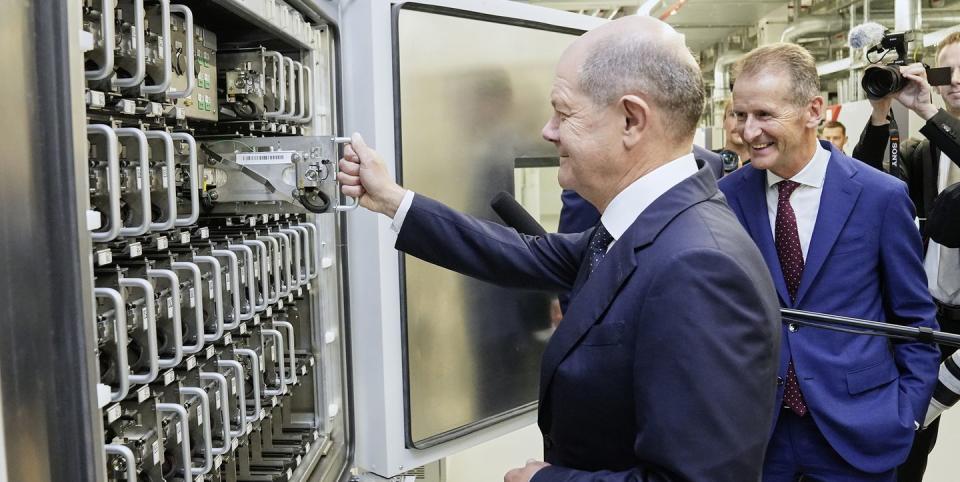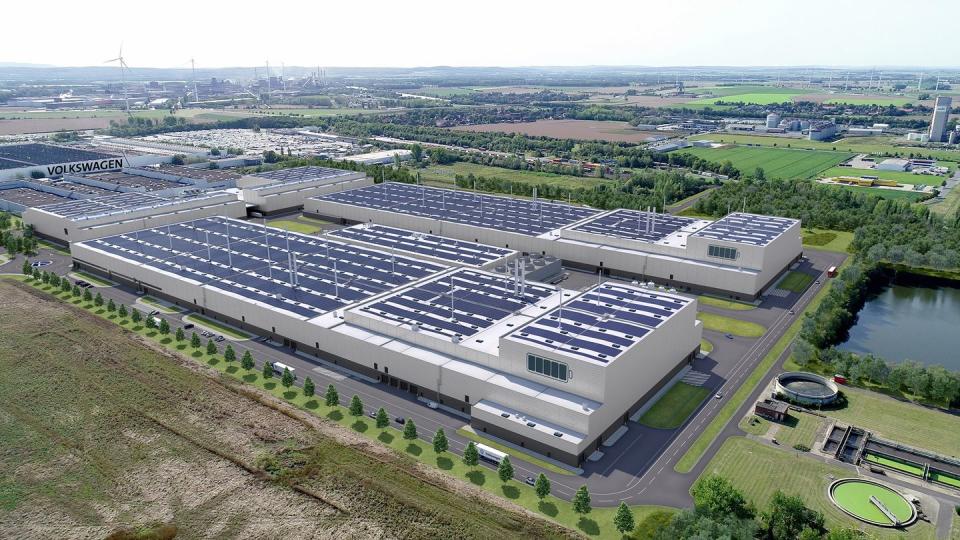VW Breaks Ground on PowerCo EV Battery Plant

VW begins building new gigafactory at its Salzgitter hub as part of its new PowerCo battery business unit, with the plant slated to have an annual capacity of 40 GWh, enough for 500,000 vehicles per year.
The Salzgitter site, which is VW's first EV battery hub, already hosts a battery research laboratory and a battery recycling pilot plant.
The Salzgitter gigafactory itself is slated to open in 2025, producing the prismatic unified cell that will be used by up to 80% of all VW Group EVs, and will be followed by other VW battery hubs in Europe including in Valencia, Spain.
VW has broken ground on a new battery plant in Salzgitter, Germany, a few days ago, which will be one of its battery hubs. With German Chancellor Olaf Scholz in attendance, the automaker simultaneously revealed that its global battery business—the launch of which was foreshadowed months ago—will be known as PowerCo. The new company will be tasked with all activities through the the entire battery value chain, from developing new battery cells to processing raw materials to recycling.
The gigafactory itself is scheduled to open in 2025, but starting now PowerCo will manage all of the Volkswagen Group's international factory operations that concern EV batteries, with a number of facilities at Salzgitter already busy at work. The PowerCo business unit will be led by CEO Frank Blome.
"In building our first in-house cell factory, we are consistently implementing our technology roadmap," Thomas Schmall, member of the Board of Management of Volkswagen AG responsible for Technology and Supervisory Board Chairman of the new company. "PowerCo will become a global battery player. The company's major strength will be vertical integration from raw materials and the cell right through to recycling. In future, we will handle all the relevant activities in-house and will gain a strategic competitive advantage in the race to take the lead in e-mobility. We have secured a top team for this great undertaking."
It has been known for a while that VW wanted to make Salzgitter its first battery hub, even before VW announced last December that it would create a standalone company for its battery business. The automaker launched a battery recycling pilot plant at Salzgitter over a year ago, in addition to opening a battery cell development lab there last fall. The Center of Excellence (CoE) Battery Cell research lab is already on track to employ over 1000 people by late 2022, with over 100 working on cell development at the moment. So the pieces had been coming together in Lower Saxony for time.

The construction of a battery plant at Salzgitter was the next major step, but one from which VW won't benefit right away—it's still about three years from coming online. VW estimates that the Salzgitter plant will reach an annual capacity of capacity of 40 GWh, which will be enough for 500,000 vehicles per year.
VW plans to produce the prismatic unified cell at Salzgitter—announced during the Group's Power Day last year—that will be used in up to 80% of all EV produced by the VW Group brands including Audi, Skoda, Porsche, SEAT, and others. The unified cell is expected to reduce battery costs by up to 50%, Volkswagen estimates.
Overall, the automaker plans to operate six cell factories in Europe with a combined production capacity of 240 GWh. Some of these factories will be operated with partners, such as Northvolt, with the next plant after Salzgitter slated to open in Valencia, Spain.
The Volkswagen Group's plans for Salzgitter reflect a growing trend among large automakers to create EV battery production hubs and to combine more parts of the battery value chain in regional hubs, pooling together everything from battery chemistry development to eventual recycling of EVs, eliminating the need to transport vehicles far to be dismantled at a single site, which would add costs to recycling.
The launch of the Salzgitter hub also reflects the Group's continued acknowledgement that automakers won't be able to rely on suppliers for EV batteries and other hardware as much as they used to in years past.


 Yahoo Autos
Yahoo Autos 